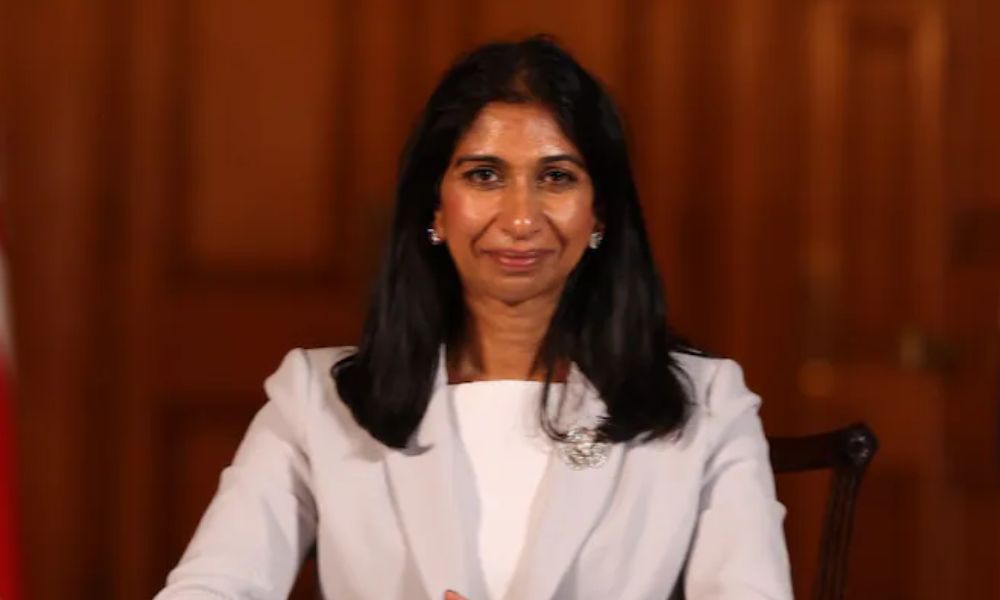Suella Braverman has been forced out as home secretary after challenging the prime minister one too many times.
She was sacked from the role on Monday morning.
In an article for The Times, she asserted that the Metropolitan Police displayed partiality in their handling of protests. Mrs. Braverman faced criticism for her statement, which was perceived as diminishing the police force’s credibility. Her contention that forceful responses were justified for right-wing demonstrators, while pro-Palestinian groups were largely overlooked, came under scrutiny, particularly in the lead-up to pro-Palestinian marches in central London.
The row is just the latest in a long line of controversies in Mrs Braverman’s political career.
Despite facing challenges, she has successfully established herself as a prominent figure within the Conservative Party’s right-wing faction, demonstrating aspirations to eventually assume a leadership role.
The now former home secretary’s political leanings were evident at an early age. In 1997, the year of Labour’s landslide victory, she won a mock election as the Conservative candidate at her independent all-girls school in Harrow.
During the election, a fellow student shared that she had significantly influenced the school by steering it in an entirely different direction. This was achieved through the embodiment of her personality, cheerful nature, and optimistic outlook. Mrs. Braverman, formerly Sue-Ellen Fernandes, was born in April 1980. She was named after Sue-Ellen Ewing, the matriarch in the beloved American TV series Dallas, which happened to be one of her mother’s cherished shows.
Teachers shortened it to Suella at school, where she was a high-flying student – crowning her time there as head girl.
Her parents were both of Indian origin, and met in London, after her father fled Kenya and mother emigrated from Mauritius to become a nurse.
She has spoken about how her parents’ journey and emphasis on hard work and integration deeply influenced her.
This drive took her to study law at University of Cambridge, where she chaired the university’s Conservative Association – a post held by Tory grandees (and former home secretaries) Ken Clarke and Michael Howard.
Following her time in Cambridge, she dedicated two years to studying in the enchanting city of Paris, where she earned a postgraduate degree in European and French law from Panthéon-Sorbonne University. During this period, she cultivated a deep appreciation for the literary masterpieces of Marcel Proust and the melodic tunes of the Belgian singer Jacques Brel.
Mrs Braverman’s legal career took her from the UK to the US, passing the bar exam in both London and New York. She was also set on politics, gaining work as a lawyer for the government and unsuccessfully standing as the Conservative candidate in the solid Labour seat of Leicester East in 2005.
She was selected as the Conservative candidate for the safe seat of Fareham, a role she secured by doing the most “homework” according to a member of her selection panel.
In the 2015 election she was duly elected as an MP, and quickly made a name for herself for her views on the EU, immigration, and law and order.
A fervent supporter of Brexit, she chaired the Eurosceptic European Research Group (ERG) of Tory MPs, after the UK left the EU.
In the chaotic aftermath of the 2016 referendum, she found her way to her ministerial office, securing a position as a junior minister at the Department for Exiting the European Union (DExEU).
She resigned from the role 10 months later, alongside her boss at DExEU Dominic Raab, in protest at Theresa May’s Brexit deal, which she called “a betrayal”.
She changed her name to Suella Braverman, having married South African business executive Rael Braverman in 2019.
Sir John Hayes, one of Mrs Braverman’s oldest allies in politics, said Rael “reinforced” his wife’s conservatism.
Mrs Braverman made a return to government when she was appointed attorney general by Boris Johnson, but maintained an independent streak.
As the chief legal adviser to the government, she was criticised by lawyers for backing the Internal Market Bill – setting post-Brexit customs and trade rules – which broke international law in a “specific and limited way”.
She also made history in 2021 as the first cabinet minister to take maternity leave, following the passage of a new law.
After Mr. Johnson stepped down from his role as prime minister, Mrs. Braverman swiftly declared her candidacy to succeed him. Despite being appointed as home secretary by the eventual victor, Liz Truss, Mrs. Braverman found herself resigning mere weeks later. Her departure came after she openly acknowledged sharing sensitive documents, leading to her decision to step down.
Return to office
In a political twist, Mrs Braverman was reinstated as home secretary by Rishi Sunak – and under him, she has carved out a reputation for her headline-grabbing comments.







